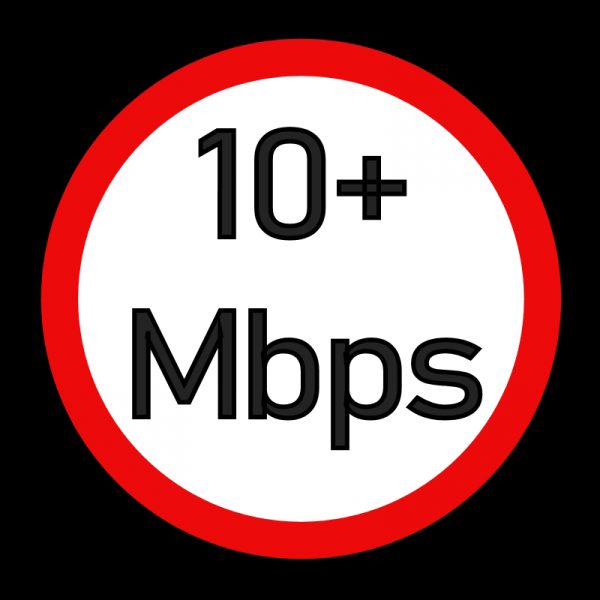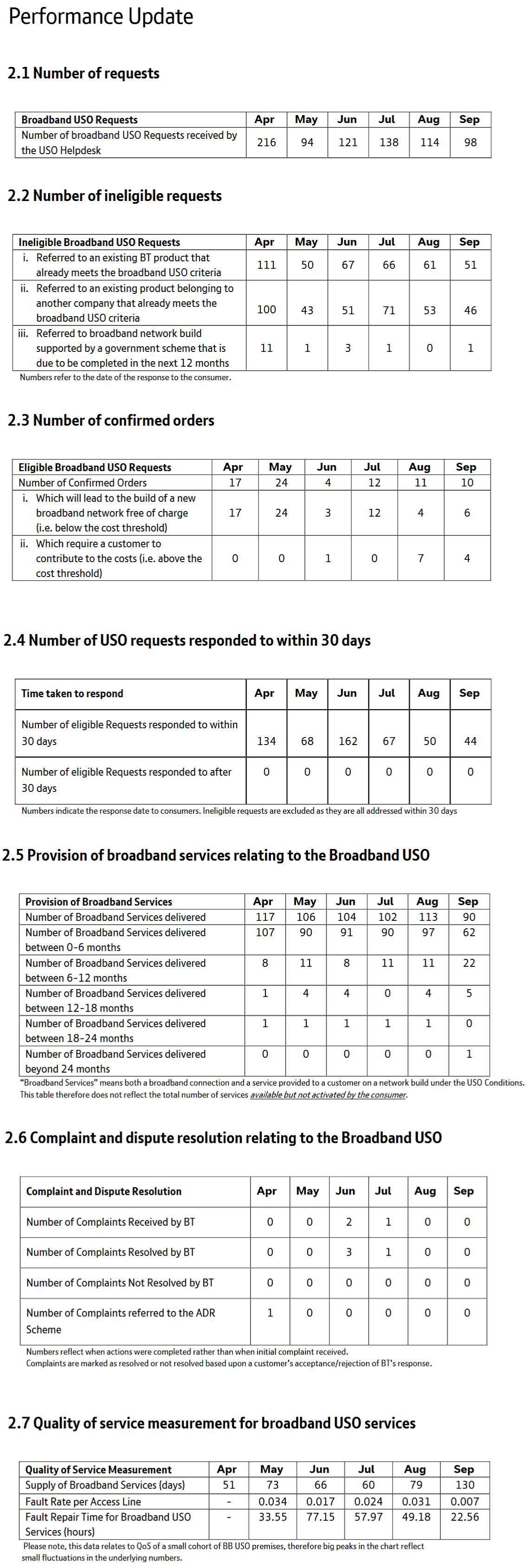October 2025 Progress Update on BT 10Mbps UK Broadband USO

ISP BT has published the biannual (October 2025) progress update on their delivery of Ofcom’s somewhat unpopular 10Mbps Universal Service Obligation (USO) for broadband. The provider has so far helped to build a USO connection to over 8,553 premises (up from 8,411 in April 2025), with 186 further builds in-progress (down from 349).
The USO is a legally-binding and industry-funded obligation that falls on BT across the UK and KCOM in Hull. In short, people living in areas where they can’t yet receive a 10Mbps or faster download speed, and aren’t expected to be covered by such a network in the next 12-months, can request a service capable of 10Mbps+ (1Mbps+ upload) from the aforementioned internet providers.
A cost sharing model also applies here, which means that the providers will “calculate the total excess cost of the build and divide that between the eligible premises. If that amount is below £5,000 per premises (on top of the £3,400), we’ll automatically split the costs“. But some areas can still end up costing hundreds of thousands of pounds, even up to £1-2m, and would thus find the USO route to be unviable (here and here).
Advertisement
Ofcom states that 48,000 UK premises (0.2%) currently fall into the USO gap (i.e. those outside of suitable fixed line, fixed wireless or 4G mobile coverage) or c.370,000 premises if you exclude wireless solutions. But the regulator predicts the current 48k figure could fall to 19k by January 2028, mostly as a result of upgrades delivered via ongoing publicly funded schemes (gigabit vouchers, project gigabit contracts etc.).
Just to be clear about this. Many of those who pursue the USO option via BT say they were offered 4G (mobile broadband) connections via EE instead, but those actually considered to have been delivered under the USO itself usually get Fibre-to-the-Premises (FTTP). Commercial builds of the latter have also helped to shrink the USO gap (tackling the first c.80%+ of the country).
The gap will continue to shrink as both commercial and subsidised builds (e.g. the Gov’s £5bn Project Gigabit programme) expand. The government are also still exploring how best to reach those who live in “Very Hard to Reach” areas with even faster speeds – roughly equating to the same sort of area as the USO is focused upon – and at the same time they’re due to review the USO itself (here), which could lead to changes. But this work seems to have been delayed by last year’s change in government.
BT’s October 2025 Broadband USO Report
The latest statistics continue to show that the USO delivery is a slow process (e.g. in Oct 2023 there were 185 builds in progress, then 265 in April 2024, 215 in Oct 2024, 349 in Apr 2025 and now 186). We suspect this may be a combination of factors, such as a lack of consumer familiarity with the USO (apply for it here), new services like Starlink becoming available, the shrinking area of USO eligibility and the fact that the policy may be running into the limitations of economically viable deliverability.
Advertisement

Mark is a professional technology writer, IT consultant and computer engineer from Dorset (England), he also founded ISPreview in 1999 and enjoys analysing the latest telecoms and broadband developments. Find me on X (Twitter), Mastodon, Facebook, BlueSky, Threads.net and Linkedin.
« Falkland Islands Government Grants Licence for Starlink Satellite Broadband






















































It would be interesting to know how many of the properties could be serviced more cost effectively to a good standard by commercially directed improvements to 4G/5G cover (additional small masts/chains of small masts EE or OpenRAN, with wireless backhaul) to make 4G/5G wireless possible.
OfCom could make new rulings as part of USO to encourage more unlocking of this sort as opposed to focussing on a Openreach FTTP delivery or hoping for an Altnet or other regional government investment (maybe also encouraging regional government investment towards 5G OpenRAN where there is multiple deprivation)
I think the USO should have an option to operate in a way that normal BT/EE tariffs (including social tariff) operate as a “price cap” to provide USO like service via other providers if a FTTP service or EE service is not viable; i.e. BT required to subsidise a Voda3 4G/5G connection if that is what is immediately available or satellite (maybe throttled to a lower “USO” bandwidth e.g. 30 similar to lower end VDSL, or maybe shared to form a very small local FWA provision). The requirement for BT wholesale (Openreach/EE) to pay monthly to another provider (especially Starlink) would be a minor nudge towards doing the work to implement a BT wholesale solution (FTTP or EE/OpenRAN 5G mast)
It would also be interesting for OfCom to correlate the “notspots” within the USO process with the recently updated “Indices of Deprivation” https://www.gov.uk/government/statistics/english-indices-of-deprivation-2025/english-indices-of-deprivation-2025-statistical-release
A progressive government (local or national) could then focus on centrally funding on USO delivery (likely under social tariffs) for “stubborn” notspots in areas of higher multiple deprivation (where the residents are unlikely to be able to contribute for USO delivery that costs more than the £3400 per household funding level). This would provide some relief of the multiple deprivations in those areas (better digital access to all kinds of services)